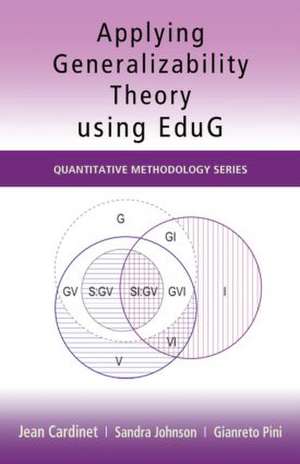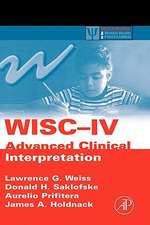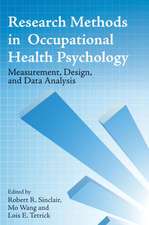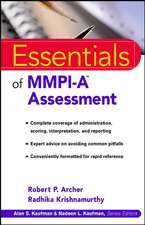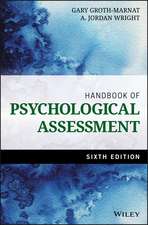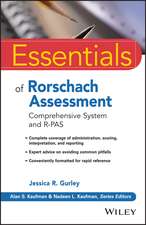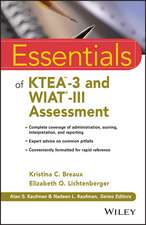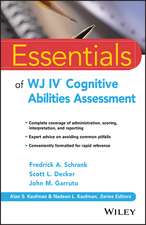Applying Generalizability Theory using EduG: Quantitative Methodology Series
Autor Jean Cardinet, Sandra Johnson, Gianreto Pinien Limba Engleză Paperback – 28 oct 2009
Readers will appreciate the conversational style used to present a comprehensive review of G theory and its application using the freeware EduG. To maximize understanding the authors illustrate all fundamental principles with concrete examples from different fields and contexts. Annotated applications lead students through the main concepts of G theory, while illustrating both the use of EduG and interpretation of its output. Formulas are avoided wherever possible. Exercises with data sets available on the Psychology Press website allow readers to carry out their own analyses to reinforce understanding.
Brief overviews of analysis of variance, estimation, and the statistical error model are provided for review. The procedures involved in carrying out a generalizability study using EduG follow, as well as guidance in the interpretation of results. Real-world applications of G theory to the assessment of depression, managerial ability, attitudes, and writing and mathematical skills are then presented. Next, annotated exercises provide an opportunity for readers to use EduG and interpret its results. The book concludes with a review of the development of G theory and possible new directions of application. Finally, for those with a strong statistical background, the appendixes provide the formulas used by EduG.
Ideal as a supplement for courses on measurement theory and/or generalizability theory taught in departments of psychology, education, medicine, and the social sciences, this text will also appeal to researchers from a variety of fields interested in learning how to apply G theory to their studies.
| Toate formatele și edițiile | Preț | Express |
|---|---|---|
| Paperback (1) | 383.89 lei 6-8 săpt. | |
| Taylor & Francis – 28 oct 2009 | 383.89 lei 6-8 săpt. | |
| Hardback (1) | 1000.27 lei 6-8 săpt. | |
| Taylor & Francis – 28 oct 2009 | 1000.27 lei 6-8 săpt. |
Preț: 383.89 lei
Nou
Puncte Express: 576
Preț estimativ în valută:
73.48€ • 79.84$ • 61.76£
73.48€ • 79.84$ • 61.76£
Carte tipărită la comandă
Livrare economică 22 aprilie-06 mai
Preluare comenzi: 021 569.72.76
Specificații
ISBN-13: 9781848728295
ISBN-10: 1848728298
Pagini: 234
Dimensiuni: 152 x 229 x 15 mm
Greutate: 0.32 kg
Ediția:1
Editura: Taylor & Francis
Colecția Routledge
Seria Quantitative Methodology Series
Locul publicării:Oxford, United Kingdom
ISBN-10: 1848728298
Pagini: 234
Dimensiuni: 152 x 229 x 15 mm
Greutate: 0.32 kg
Ediția:1
Editura: Taylor & Francis
Colecția Routledge
Seria Quantitative Methodology Series
Locul publicării:Oxford, United Kingdom
Cuprins
Introduction. 1. What is Generalizability Theory? 2. Generalizability Theory: Concepts and Principles. 3. Using EduG: The Generalizability Theory Software. 4. Applications to the Behavioral and Social Sciences. 5. Practice Exercises. 6. Current Developments and Future Possibilities. Appendixes.
Recenzii
"A wonderful book. … It provides in one place the fruits of twenty-five years of research carried out by its authors. … An “easy read” … the conceptual and statistical ideas are presented clearly; they are immediately exemplified in concrete terms. … I have used a draft of the book in my course on G theory at Stanford and graduate students have universally found the available chapters readable and clear. … The book comes with outstanding software – EduG. … It explains the use of this software thoroughly and understandably … with extensive, concrete examples." - Richard J. Shavelson, Stanford University, from the book’s foreword
"The interest in generalizability study is supported by the AERA/APA/NCME joint standards. … The publication of the book and the availability of an easy to use software will increase the interest and the use of generalizability theory. ... Fortunately for all of us, such a software and such a book now exist which will make our task of complying with the joints standards on reliability much easier. … I will certainly make the purchase of the book compulsory for my advanced courses in measurement." - Dany Laveault, University of Ottawa
"This book provides an excellent introduction to one of the most broadly defined psychometric theories currently in existence. It will clearly serve as a reference text for all researchers and advanced students interested in gaining insight to G theory. The provided easy-to-use EduG statistical computer program to compute all the analyses is a wonderful additional bonus." - George Marcoulides, University of California, Riverside
"This book provides an excellent introduction to one of the most broadly defined psychometric theories currently in existence. It will clearly serve as a reference text for all researchers and advanced students interested in gaining insight into G theory. The provided easy-to-use EduG statistical computer program to compute all the analyses is a wonderful additional bonus." - George Marcoulides, University of California - Riverside
"The interest in generalizability study is supported by the AERA/APA/NCME joint standards. … The publication of the book and the availability of an easy to use software will increase the interest and the use of generalizability theory. ... Fortunately for all of us, such a software and such a book now exist which will make our task of complying with the joints standards on reliability much easier. … I will certainly make the purchase of the book compulsory for my advanced courses in measurement." - Dany Laveault, University of Ottawa
"This book provides an excellent introduction to one of the most broadly defined psychometric theories currently in existence. It will clearly serve as a reference text for all researchers and advanced students interested in gaining insight to G theory. The provided easy-to-use EduG statistical computer program to compute all the analyses is a wonderful additional bonus." - George Marcoulides, University of California, Riverside
"This book provides an excellent introduction to one of the most broadly defined psychometric theories currently in existence. It will clearly serve as a reference text for all researchers and advanced students interested in gaining insight into G theory. The provided easy-to-use EduG statistical computer program to compute all the analyses is a wonderful additional bonus." - George Marcoulides, University of California - Riverside
